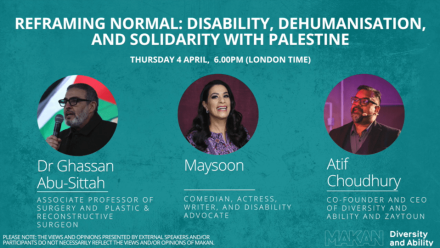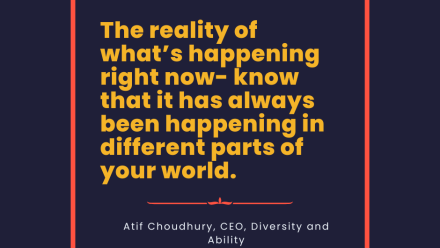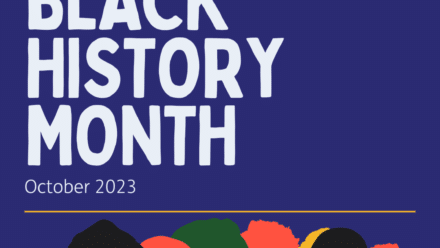Disability, Dehumanisation and Solidarity with Palestine
30th April 2024 by Sara Khan and Aatikah Rashid (Makan) with comments from Diversity and Ability
Makan and Diversity and Ability

This blog post was written by Sara Khan and Aatikah Rashid (Makan) with comments from Diversity and Ability.
Content advisory: This post contains mentions of violence, torture and death, including descriptions of specific instances of violence.
At Diversity and Ability, our purpose is to create a world in which everyone can participate and thrive, through the strength and value of lived experience.
“Everyone” means everyone, regardless of race, gender, class, migrant status, sexuality, or disability. “Everyone” means everyone, including Palestinian people. You can read our statement on Gaza and Israel on our blog.
As part of our mission, we have partnered with Palestinian-led education organisation Makan. Most recently, our CEO, Atif Choudhury, joined Makan for a live panel shedding light on the experiences of disabled Palestinians, the dehumanisation that all Palestinians face, and the dangerous intersection of the two. You can catch up with the panel on Makan’s Vimeo.
Atif commented about the panel:
‘In many spaces that I am asked to speak at, I feel I’m expected to adhere to the conventions of what feels comfortable for that room, to not challenge widely held narratives. But this conversation demands sincerity and solidarity, and it’s for this reason it is so important for us to continue to engage with.’
The devastating offensive in the Gaza Strip has disabled and left psychological scars on those who remain. The exact number of Disabled people in Gaza remains uncertain. But we do know that, as of October 7, there are at least 130,000 disabled people and at least 21% of households had at least one disabled person.
Who is Makan?
Makan is a Palestinian-led organisation providing transformative education to strengthen the movement for Palestinian liberation. They help to shift the mainstream narrative on Palestine to one that upholds Palestinian freedom, justice and dignity by:
- delivering educational workshops on Palestine and intersecting struggles;
- building useful resources and tools for advocates, and
- connecting people and organisations that are active on the issue.
How are disabled people being affected by the current violence and displacement?
Challenges in evacuation
Disabled Palestinians are unable to evacuate areas quickly during Israeli attacks. People who are physically disabled may not have access to evacuation routes they can navigate independently, while individuals who are Deaf, hard of hearing, blind, or learning disabled may not be able to perceive or respond to the situation around them.
Shortage of medication
Israel’s 16-year blockade of the Gaza Strip already made accessing essential medical support a consistent challenge for Palestinian people. The current assault and blocking of humanitarian aid into Gaza has led to severe shortages of medical supplies, equipment, and medication.
“In the UK, conversations about the ongoing ADHD medication shortage are a regular feature of our headlines- for better or for worse. But as disabled and neurodiverse Palestinians face the double dehumanisation of disableism and anti-Palestine discrimination, the mirrored impacts of these shortages are unrecognised and undiscussed.” (Diversity and Ability)
Lack of access to water
On October 11, Israel cut off all water supplies to Gaza. Disabled people face increased difficulty in accessing clean drinking water. Often, a combination of disabling barriers leaves disabled people forced to drink from groundwater sources that are nearly entirely unfit for human consumption.
Lack of access to food
Even before October 7, 80% of Gaza’s population relied on humanitarian aid. People, including disabled people, must now go to great lengths to access food. Starvation is being used as a weapon of war and many are unable to meet their basic food requirements.
Overcrowded shelters
Disabled people who have been displaced are taking shelter in hospitals, schools, and makeshift camps which are not equipped to meet their needs. They are suffering from severe overcrowding, appalling conditions, and lack of access to basic services.
Access to sanitation
Disabled people who have been displaced have reported that they are unable to access toilets at their shelters. Often toilets in UNRWA schools and other shelters are squat toilets, which are inaccessible to many disabled people.
Psychological toll
Before October 7, it was reported that one-third of Gaza’s population needed psychosocial health services. The recent bombardments have exacerbated severe trauma symptoms, especially among children. Disabled people experience psychological distress due to Israel’s closure of roads and fears of being unable to flee attacks.
Mental Health in Palestine
Palestine is reported to show some of the world’s highest rates of mental illness, with the highest levels of depression in the Eastern Mediterranean region. Data from 2020 revealed at least 562 suicide attempts annually in Gaza, and the population in occupied Palestine is reported to display high numbers of Post Traumatic Stress Disorder (PTSD). But Samah Jabr, chair of the mental health unit at the Palestinian Ministry of Health challenges the notion of PTSD for Palestinians: “For a Palestinian in Gaza whose home was bombarded, the threat of having another bombardment is a very real one … There’s no post because the trauma is repetitive and continuous.”
In Palestine, settler colonialism plays a key role as a disabling and debilitating force. It does so by exploiting disability, by actively disabling people, and by creating debilitating environments likely to cause further disablement.
“We’re currently seeing a depoliticisation of conversations around mental health in the West, as it becomes removed from the context of disability rights and justice and reduced to conversations around ‘wellbeing’. A well-being framework fails to adequately address the needs of the Palestinian population.” (Diversity and Ability)
Atif adds:
“If the World Health Organisation recognises mental health loss and the impact of mental health loss on communities as the greatest disability in the world then surely 75 years of militarisation, land loss and communities torn apart from war is the making of the greatest mental health crisis in the world. In this space, we come to recognise our solidarity and duty of care to communities of people who don’t get to share their stories.”
Exploitation of Disability
Israel deliberately targets disabled people. For example:
- Kamal Zghair, a 57-year-old wheelchair user, was shot and then run over by an Israeli tank in 2002 during the Second Intifada.
- Jamal Fayed, a 37-year-old wheelchair user, died under the rubble of his home after an Israeli military bulldozer operator refused to allow his family to rescue him before razing the house to the ground during the Second Intifada.
- In 2020, Eyad al-Halaq, a 31-year-old autistic man was on his way to school when he was shot and killed by Israeli police.
- Ezz al-Din al-Banna, 40, a disabled man, was brutally beaten and dragged across the floor by Israeli soldiers in November 2023. He was arrested while seeking shelter in Gaza City during the current offensive. His wounds caused complications that led to his death in February 2024.
Disabling people (or, creating disability)
Israeli settler colonialism disables people by creating mental and physical disabilities for many Palestinians.
- From March 2018 to December 2019, thousands of Palestinians in Gaza participated in protests at the separation fence with Israel. The Israeli military killed 214 Palestinians, including nine disabled individuals. Thousands more were wounded, with at least 178 protesters now disabled. Reports confirm a pattern of deliberate shooting-to-maim by Israeli forces, targeting areas of the body likely to cause life-changing disabilities.
- In 2016, Bethlehem-based Palestinian NGO BADIL reported a surge in injuries among Palestinians in refugee camps, with Israeli forces targeting the lower limbs of youth, a practice known as “kneecapping”. An Israeli army commander, dubbed “Captain Nidal,” is reported to have said: “I will make all the youth of the camp disabled…I will have all of you walking with crutches and in wheelchairs.” These threats reveal a deliberate Israeli military strategy to suppress resistance, instil fear among Palestinian youth, and cause lasting physical and mental harm.
The inaction of the British government in this crisis is inextricably linked to the British government’s own mistreatment and human rights violations of Disabled people. The UN have even recognised the UK government’s violation of Disabled people’s rights. The government’s alignment with Israel is representative of its disregard for the safety, prosperity and life of Disabled people, at home and abroad. Let’s not only discuss Disability justice in the policies that directly affect our own daily lives, but also the ongoing struggle of our community across the world, especially when our government is contributing to oppression on both fronts.
Creating debilitating environments
Israeli settler colonialism creates debilitating environments that might not create an immediate, recognisable or easily definable ‘disability’, but which slowly wears communities down and in the long-term will cause poor health outcomes and, most likely, early death. There are deep long-term physical and psychological impacts of:
- Exposure to white phosphorus and bombs
- Enforced calorie restriction
- Restrictions on water
- Limited freedom of movement
- Restricted access to medical care
While the UK purports to leave behind its colonial reputation, its foreign policy objectives continue to perpetuate it. The UK is still exporting arms to Israel, despite the continued loss of life and ongoing disablement of millions. Not even a self-serving desire to protect the interests and lives of UK citizens seems to be enough for the government, with even the death of UK citizens providing aid and concerns from arms workers over their complicity in the genocide not being recognised.
There is no way of separating the government’s foreign and home policies. We should see foreign policy not as a different set of rules and relationships, but as a reflection of the true intent and nature of the government’s position on Disabled people; it’s just what they know they can’t get away with at home.
The call for Palestinian freedom is also a call for an anti-colonial disability justice. Standing in support of Palestine is an extension of disability activism. The division of minorities into segregated and siloed groups weakens us and our mission. D&A stands with Disabled Palestinians as we know that our collective liberation, the liberation of the most marginalised within our communities, represents the liberation of us all.
Sources:
- How people with disabilities in Gaza are coping with the agony of Israel-Hamas war | Arab News
- New catastrophic plight in Gaza: Israel’s attacks leave more than 5,000 Palestinians disabled | Relief Web
- Gaza’s disabled face a death sentence | The New Arab
- Israeli Attacks, Blockade Devastating for People with Disabilities | Human Rights Watch
- Israeli Restrictions Harm People with Disabilities | Human Rights Watch
- Israel maintains a systematic policy of intentionally maiming Palestinian protestors, charge rights groups | WAFA News
- How Israel is disabling Palestinian teenagers | Al Jazeera
- The targeting of Palestinian youth in Dheisheh refugee camp continues | BADIL
- Gaza’s youth are turning to suicide amid growing desperation | Relief Web
- Palestine’s head of mental health services says PTSD is a western concept | Quartz
- What Palestinians experience goes beyond the PTSD label |Middle East Eye
- How a Palestinian man with autism was killed by Israeli police | Al Jazeera
- War on Gaza: How Israeli army brutality killed a disabled Palestinian man | Middle East Eye
Author Bios:
Sara Khan (she/her and they/them)
Sara studied Literature at the University of Manchester. Before they joined Makan they spent 4 years representing marginalised students at the University of Manchester Students’ Union, then the National Union of Students. Sara is also a freelance writer and co-founder of Game Assist, a multimedia project focused on drawing attention to liberation politics in gaming. Sara is the Programmes and Impact Officer at Makan.
Aatikah Rashid (she/her)
Aatikah is the Communications Manager at Makan. Before joining Makan, she worked in marketing and advertising. After becoming involved in international development and engaging in several volunteer opportunities, she transitioned into communications for the public, nonprofit, and human rights sectors.
Additional comments from Scarlett James (D&A).


